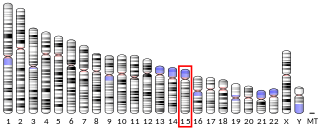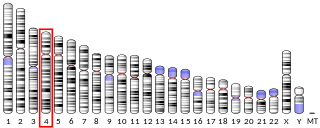Solute carrier family 30 member 10 is a protein that in humans is encoded by the SLC30A10 gene. [5]
Solute carrier family 30 member 10 is a protein that in humans is encoded by the SLC30A10 gene. [5]
This gene is highly expressed in the liver and is inducible by manganese. Its protein product appears to be critical in maintaining manganese levels, and has higher specificity for manganese than zinc. Loss of function mutations appear to result in a pleomorphic phenotype, including dystonia and adult-onset parkinsonism. Alternatively spliced transcript variants have been observed for this gene. [provided by RefSeq, Mar 2012].

Parkinsonism is a clinical syndrome characterized by tremor, bradykinesia, rigidity, and postural instability. These are the four motor symptoms found in Parkinson's disease (PD) – after which it is named – dementia with Lewy bodies (DLB), Parkinson's disease dementia (PDD), and many other conditions. This set of symptoms occurs in a wide range of conditions and may have many causes, including neurodegenerative conditions, drugs, toxins, metabolic diseases, and neurological conditions other than PD.

Zinc transporter 8 (ZNT8) is a protein that in humans is encoded by the SLC30A8 gene. ZNT8 is a zinc transporter related to insulin secretion in humans. In particular, ZNT8 is critical for the accumulation of zinc into beta cell secretory granules and the maintenance of stored insulin as tightly packaged hexamers. Certain alleles of the SLC30A8 gene may increase the risk for developing type 2 diabetes, but a loss-of-function mutation appears to greatly reduce the risk of diabetes.

Natural resistance-associated macrophage protein 2, also known as divalent metal transporter 1 (DMT1) and divalent cation transporter 1 (DCT1), is a protein that in humans is encoded by the SLC11A2 gene. DMT1 represents a large family of orthologous metal ion transporter proteins that are highly conserved from bacteria to humans.

Thiamine transporter 2 (ThTr-2), also known as solute carrier family 19 member 3, is a protein that in humans is encoded by the SLC19A3 gene. SLC19A3 is a thiamine transporter.

Torsin-1A (TorA) also known as dystonia 1 protein (DYT1) is a protein that in humans is encoded by the TOR1A gene. TorA localizes to the endoplasmic reticulum and contiguous perinuclear space, where its ATPase activity is activated by either LULL1 or LAP1, respectively.

Epsilon-sarcoglycan is a protein that in humans is encoded by the SGCE gene.

Sialin, also known as H(+)/nitrate cotransporter and H(+)/sialic acid cotransporter, is a protein which in humans is encoded by the SLC17A5 gene.

Sodium- and chloride-dependent creatine transporter 1 is a protein that in humans is encoded by the SLC6A8 gene.

Sodium- and chloride-dependent glycine transporter 2, also known as glycine transporter 2 (GlyT2), is a protein that in humans is encoded by the SLC6A5 gene.

Zinc transporter 4 is a protein that in humans is encoded by the SLC30A4 gene.

Zinc transporter 7 is a protein that in humans is encoded by the SLC30A7 gene.

Multidrug and toxin extrusion protein 1 (MATE1), also known as solute carrier family 47 member 1, is a protein that in humans is encoded by the SLC47A1 gene. SLC47A1 belongs to the MATE family of transporters that are found in bacteria, archaea and eukaryotes.

Zinc transporter 1 is a protein which in humans is encoded by the SLC30A1 gene.

Major facilitator superfamily domain containing 8 also called MFSD8 is a protein that in humans is encoded by the MFSD8 gene. MFSD8 is an atypical SLC, thus a predicted SLC transporter. It clusters phylogenetically to the Atypical MFS Transporter family 2 (AMTF2).

Solute carrier organic anion transporter family member 2A1, also known as the prostaglandin transporter (PGT), is a protein that in humans is encoded by the SLCO2A1 gene.

Zinc transporter 3 also known as solute carrier family 30 member 3 is a protein in humans that is encoded by the SLC30A3 gene.

Acetyl-coenzyme A transporter 1 also known as solute carrier family 33 member 1 (SLC33A1) is a protein that in humans is encoded by the SLC33A1 gene.

Solute carrier family 13 (sodium-dependent citrate transporter), member 5 also known as the Na+/citrate cotransporter or mIndy is a protein that in humans is encoded by the SLC13A5 gene. It is the mammalian homolog of the fly Indy gene.
Zinc transporter proteins (Zrt), or simply zinc transporters, are membrane transport proteins of the solute carrier family which control the membrane transport of zinc and regulate its intracellular and cytoplasmic concentrations. They include two major groups: (1) the zinc transporter (ZnT) or solute carrier 30 (SLC30) family, which controls the efflux of zinc from the cytoplasm out of the cell and from the cytoplasm into vesicles; and (2) the zinc importer, Zrt- and Irt-like protein (ZIP), or solute carrier 39A (SLC39A) family, which controls the influx of zinc into the cytoplasm from outside the cell and from vesicles.

SLC45A1 is a member of the SLC45 family of solute carriers. Analysis of the protein function in a recombinant yeast expression assay show that it can: (i) transport a disaccharide, such as glucose and sucrose (ii) perform secondary active transport in a proton-dependent manner.
. Zeglam A, Abugrara A, Kabuka M. Autosomal-recessive iron deficiency anemia, dystonia and hypermanganesemia caused by new variant mutation of the manganese transporter gene SLC39A14. Acta Neurol Belg. 2019 Sep;119(3):379-384. doi: 10.1007/s13760-018-1024-7. Epub 2018 Sep 19. PMID 30232769.